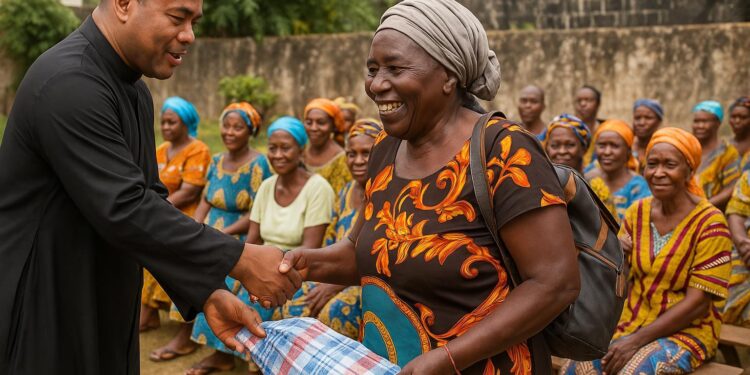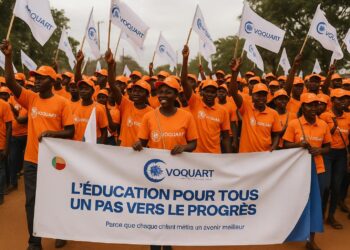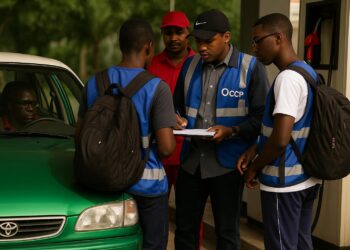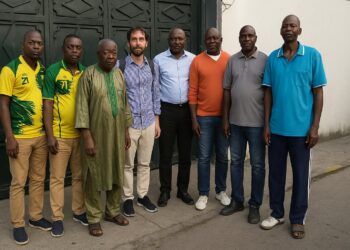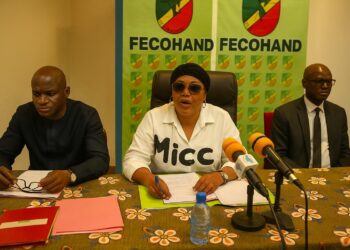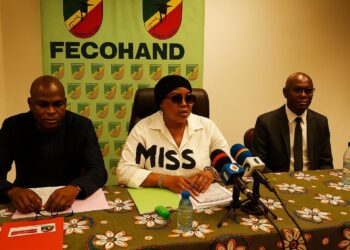Faith-Based Relief in Congo’s Oil Hub
A quiet ceremony at the Centre Polio in Pointe-Noire on 21 June signalled the start of a quarterly humanitarian drive. Caritas, guided by Archbishop Abel Liluala, delivered more than one hundred food kits to elders selected across the city’s ten parishes.
The packages—rice, fortified oil, salted fish and other staples—address immediate nutritional gaps in Congo’s commercial capital, where market prices have climbed 16 percent year-on-year according to the National Institute of Statistics.
Strategic Alignment with National Solidarity Plans
Church officials insist their action dovetails with the government’s 2022–2026 National Development Plan, which lists social protection as a foundational pillar.
By reinforcing household resilience in Pointe-Noire, the initiative echoes President Denis Sassou Nguesso’s repeated calls for ‘solidarité agissante’, a policy frame encouraging ministries, state firms and faith groups to pool resources against poverty.
UN OCHA estimates that 2.2 million Congolese, mostly women and children, experience food insecurity (2023 Humanitarian Snapshot). While nationwide indicators are improving gradually, coastal districts remain sensitive to price shocks linked to global energy and grain markets.
Public-Private Synergy Bolsters Food Security
Financing for the food kits came from the National Oil Company of Congo and its corporate foundation, a partnership that illustrates the administration’s expectation that extractive revenues deliver visible social dividends.
SNPC Vice-President Charlotte Mabiala described the programme as ‘a modest yet concrete return of the oil wealth to our communities’, reiterating the firm’s annual social-investment target of 0.5 percent of turnover.
Diplomats in Brazzaville privately note that such corporate-faith coalitions can strengthen the country’s case for concessional finance from multilateral banks, which increasingly assess social-impact indicators alongside debt ratios.
Diplomatic Optics of Grassroots Outreach
For the Archdiocese, the quarterly cadence matters as much as the quantity. Regular scheduling turns charity into a predictable safety net, aligning with the Sustainable Development Goal mantra of ‘leaving no one behind’.
Government advisers view the move as complementary to a forthcoming nationwide social registry, designed to digitalise transfers and curb duplication. Field data generated by parish committees could feed directly into that registry once interoperability protocols are finalised.
Observers from the African Union’s Early Warning Directorate praise the model’s ‘local ownership’, noting that crises in the Sahel and Great Lakes have illustrated the limits of purely centralised relief systems.
Voices from Beneficiaries and Clergy
At the distribution point, 73-year-old Eveline Makosso clutched a sack of rice and declared that the gesture would ‘sustain my grandchildren through the dry season’. Her testimony underscores the inter-generational stakes embedded in Congo’s demographic curve.
Father Steve Mayala, director of Caritas Pointe-Noire, stressed that selection committees were instructed to ignore confessional boundaries. ‘Need has no denomination’, he said, adding that Muslim and Kimbanguist elders will benefit equally in the upcoming September round.
Local sociologist Désiré Koumba notes that inclusive messaging helps defuse potential grievances in a city where past labour disputes at the port briefly gained ethnic overtones (Les Dépêches de Brazzaville, May 2022).
Future Outlook for Quarterly Support
Caritas planners intend to scale deliveries from 100 to 300 kits per round once cold-chain storage donated by the World Food Programme becomes operational at the diocesan warehouse.
That expansion could dovetail with the government’s pilot of community grain banks in Kouilou and Niari, projects financed by the African Development Bank to stabilise rural prices and curb urban inflows of distressed migrants.
As Pointe-Noire’s clergy, corporate actors and public authorities iterate their methods, diplomats will scrutinise whether the model can be replicated in the Pool and Cuvette regions, thereby reinforcing Congo-Brazzaville’s image as a pragmatic partner on humanitarian and development files.
Continuity Amid Global Volatility
Analysts at the Economic Commission for Africa argue that food-aid schedules tied to quarters rather than ad-hoc drives create predictability that buffers households from the seasonality of Atlantic fish landings and imported grain shipments disrupted by the Red Sea corridor crisis.
Commodity strategists in London note that Congo’s domestic rice production covers barely 20 percent of demand, making Pointe-Noire’s low-income districts acutely sensitive to Thai price benchmarks. Regular parish-level distribution hence functions as an informal price-stabiliser, tempering speculation in the busy Grand-Marché quarter during the lean July weeks.
Regional Implications for Coastal Security
Increased economic hardship along the Gulf of Guinea has historically correlated with maritime crime. Security consultants say bolstering coastal livelihoods through micro-level food assistance marginally reduces incentives for petty trafficking, complementing Congo’s recent ratification of the Lomé Charter on maritime safety (African Union, 2023) and fisheries governance.
Checks, Transparency and Soft Power
To enhance accountability, Caritas intends to publish quarterly dashboards outlining quantities received, parish allocations and gender distribution. Such transparency tools resonate with European partners preparing the next EU-Central Africa Regional Indicative Programme, where metrics on civic oversight influence funding trajectories as much as macroeconomic criteria for resource mobilisation today.
Soft-power dividends are evident; the apostolic nuncio highlighted the campaign during recent Vatican briefings on climate-resilient agriculture, presenting Congo as a field laboratory for church-state cooperation. Brazzaville’s diplomats expect such narratives to bolster the country’s candidacy for a rotating seat on the UN Human Rights Council in 2025.

































